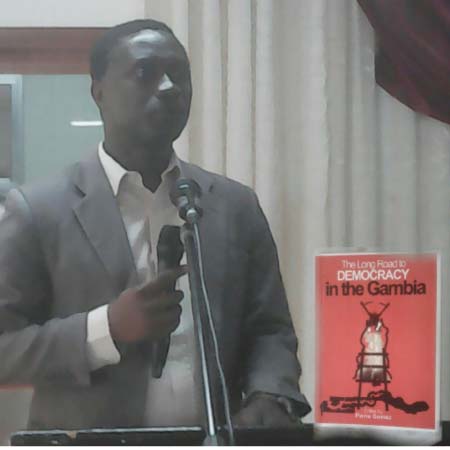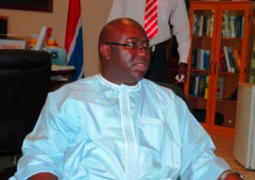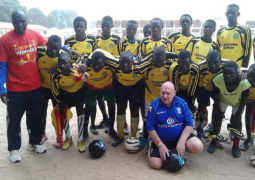
‘The
Long Road to Democracy in The Gambia’, an anthology of the recent historical
transformation of political power in The Gambia, was launched on 23 February at
the Gambia Tourism and Hospitality Institute in Kanifing.
The
book, compiled by Prof. Pierre Gomez of the University of The Gambia,
chronicles the December 2016 presidential election of The Gambia which brought
the 22-year rule of one of Africa’s longest serving dictator, Yahya Jammeh, and
the impasse that followed and the eventual solving of the political crisis.
The
anthology is divided into three phases: the first stage describes the time
Gambians went to the poll; the second phase explains how excited The Gambia was
when the incumbent lost to the coalition candidate; and the third part was the time
of the impasse which began when the incumbent announced on national television
that he is not stepping down, the state of emergency and the fleeing of
Gambians to Senegal.
The
book includes poems written by Gambian poets expressing their feelings and
emotions through the pen on various topics such as bad governance, ethnic
alienation, human rights violations as posted on the social media.
Speaking
on the occasion, Abdul-Karim Kamara of the UTG said the Gambia’s road to
democracy was not an easy one, “but the contribution of youth on social media
played a vital role towards the achievement of democracy after a long journey”.
He
said it was important that the contributions and the struggles are documented
so that the younger generation could know how Gambians felt during the
struggle.
Dr
Ismaila Cessay, a political science lecturer at the UTG, giving a review of the
book, said the anthology documented the collective feelings and sentiments of
the whole of Gambia during the impasse.
It
also documented how Gambians fled when their democracy was violated with total
disregard, he said.
“The
former president Yahya Jammeh himself should read this book to know the
position he led the nation to and how they responded,” he said.
Musa
Bah, one of the contributors in the book, said at the time of the impasse, he
was afraid because his family members always asked him to stop writing his
poems but looking at the large number of people fleeing The Gambia made him cry
so he could not stop expressing himself in through poems.
“We
have won the battle, but not the war. We
have to write more to maintain democracy in The Gambia,” he said.
Famara
Fofana, a journalist who also contributed to the book, said it is his duty as a
poet and journalist to inform and educate the people.
Marabi
Hydara, author of ‘Gambia has Decided’, said as poets, they write when they are
happy, sad or crying.
Prof
Pierre Gomez, the author/compiler, said the publication of the book does not
mean he and his team are campaigning for the coalition government.
“Instead,
this anthology is to bring together the collective voices of young people
through social media who struggled to ensure that democracy and sanctity is
returned to The Gambia,” he said.
The
chief launcher of the book, Madam Hannah Foster, executive secretary of African
Centre for Democracy and Human Right Studies, said there is no easy way or a
shortcut to democracy.
She
noted that the Gambian youth have contributed greatly in making sure that the
tyranny is ended and democracy prevails.



